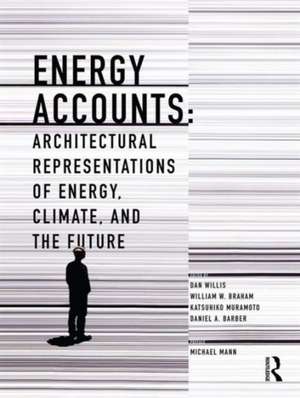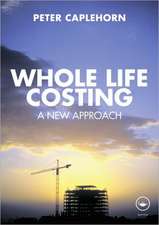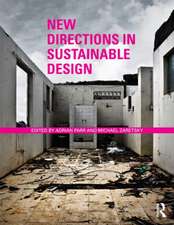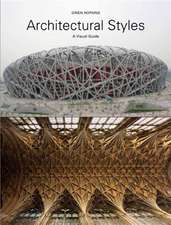Energy Accounts: Architectural Representations of Energy, Climate, and the Future
Editat de Dan Willis, William Braham, Katsuhiko Muramoto, Daniel Barberen Limba Engleză Paperback – 29 iun 2016
| Toate formatele și edițiile | Preț | Express |
|---|---|---|
| Paperback (1) | 333.82 lei 6-8 săpt. | |
| Taylor & Francis – 29 iun 2016 | 333.82 lei 6-8 săpt. | |
| Hardback (1) | 997.11 lei 6-8 săpt. | |
| Taylor & Francis – 29 iun 2016 | 997.11 lei 6-8 săpt. |
Preț: 333.82 lei
Preț vechi: 375.98 lei
-11% Nou
Puncte Express: 501
Preț estimativ în valută:
63.88€ • 66.83$ • 53.06£
63.88€ • 66.83$ • 53.06£
Carte tipărită la comandă
Livrare economică 02-16 aprilie
Preluare comenzi: 021 569.72.76
Specificații
ISBN-13: 9781138914117
ISBN-10: 1138914118
Pagini: 314
Ilustrații: 274
Dimensiuni: 189 x 246 x 20 mm
Greutate: 0.86 kg
Ediția:1
Editura: Taylor & Francis
Colecția Routledge
Locul publicării:Oxford, United Kingdom
ISBN-10: 1138914118
Pagini: 314
Ilustrații: 274
Dimensiuni: 189 x 246 x 20 mm
Greutate: 0.86 kg
Ediția:1
Editura: Taylor & Francis
Colecția Routledge
Locul publicării:Oxford, United Kingdom
Public țintă
Postgraduate, Professional, Professional Practice & Development, and UndergraduateCuprins
Notes on Contributors. Foreword. Preface: The Hockey Stick and the Climate Wars Michael Mann Introduction: Energy Accounts Part 1: Accounting for Energy 1. Roadmap 2050 OMA/European Climate Commission 2. Implementing a New Energy Regime in Housing David E. Nye 3. Thermodynamic Materialism Iñaki Abalos and Renata Sentkiewicz 4. Designing Better Energy Metrics for Consumers Richard P. Larrick, Jack B. Soll, and Ralph L. Keeney 5. Visualizing Change Reinhold Martin 6. Cooking the Books (On a Solar-Powered Stove) David Owen 7. Visualizing Energy Consumption Activities as a Tool for Making Everyday Life More Sustainable Kajsa Ellegård and Jenny Palm 8. The Materialities of Big Data Jenny Rhee Part 2: Representing Energy 9. A Sense for Energy Erik E. Olsen 10. Evaluating Urban Resource Efficiency Christoph Reinhart and Emmanouil Saratsis 11. Go With the Flow Mitch Tobin 12. Bounding. More or Less Billie Faircloth and Ryan Welch 13. Ladybug + Honeybee Mostapha Sadeghipour Roudsari 14. Net Zero Capable Tim MacDonald 15. Ducks, Dollars, or kWh Vivian Loftness, Azizan Aziz, Bertrand Lasternas, and Sebastian Peters 16. Visualization to Support Facility Operation and Maintenance Semiha Ergan and Xue (Sheryl) Yang 17. Energy Accounts ISA (Interface Studio Architects) 18. Abstracting Energy Forrest Meggers 19. Visualizing a Change of Energy Regimes William W. Braham 20. The New Chautauqua Game William W. Braham, Jill Kurtz, Luke Butcher, and Mostapha Sadeghipour Roudsari 21. Spatialized Energy Diagrams Kiel Moe Part 3: Representing Climates and Regions 22. Cities, Sustainability, and Resilience Vishaan Chakrabarti 23. Delivering Density Dan Willis 24. Scaling Regionalism Stephen Kieran 25. Efficient Urban Forms in the Pearl River Delta, China Stefan Al 26. Park Royale Woha 27. The Climate Control Project Daniel A. Barber 28. Energy in Place Lateral Office 29. Japan, Korea, and Cultural Dimension of Thermal Comfort Katsuhiko Muramoto and Jin Baek 30. Philadelphia Projects Todd Woodward 31. Farming Fuel Rania Ghosn 32. Regionalism Revisited Keith Eggener 33. Glen Eagles Community Centre Vancouver, BC Patkau Architects Figure Credits. Index
Recenzii
"In a culture of images, visual narratives are as important as arguments. Architects think with their eyes, and the authors of Energy Accounts are phenomenally qualified to present academic research and professional experiences on energy and climate with graphic eloquence. The contemporary dilemmas faced by buildings, cities and regions are comprehensively covered, and the book offers a pixellated portrait of the field which should influence both design and policy." - Luis Fernández-Galiano, Int FRIBA, is a Professor of Architecture, Universidad Politécnica de Madrid
“The book offers an abundance of forward-thinking scholarship on many important issues. From big data to architecture to economics, there is a lot going on here of contemporary relevance to disciplines across the sciences and humanities. The overarching topics, energy and climate, are timely, as are the multitude of interdisciplinary perspectives offered by the dozens of authors who contributed to the 32 essays. Key to the project are the visual aids: diagrams, graphs, charts, maps, photographs, figures, and data visualizations are interspersed throughout the essays. The images are not peripheral to the discussion: the authors use visual representations to tell their respective stories about energy and climate ... Both implicitly and explicitly, the volume makes a strong and convincing case for the value of visualizations in scholarly works. Highly recommended.” - P. Gamsby, Memorial University, Choice Magazine, July 2017
“The book offers an abundance of forward-thinking scholarship on many important issues. From big data to architecture to economics, there is a lot going on here of contemporary relevance to disciplines across the sciences and humanities. The overarching topics, energy and climate, are timely, as are the multitude of interdisciplinary perspectives offered by the dozens of authors who contributed to the 32 essays. Key to the project are the visual aids: diagrams, graphs, charts, maps, photographs, figures, and data visualizations are interspersed throughout the essays. The images are not peripheral to the discussion: the authors use visual representations to tell their respective stories about energy and climate ... Both implicitly and explicitly, the volume makes a strong and convincing case for the value of visualizations in scholarly works. Highly recommended.” - P. Gamsby, Memorial University, Choice Magazine, July 2017
Notă biografică
Dan Willis is a practicing architect and Professor of Architecture at Penn State University. His research and writing focus on the intersection of architecture and technology. He is the author of The Emerald City and Other Essays on the Architectural Imagination, and co-editor and contributor to Architecture and Energy: Performance and Style.
William W. Braham is a Professor of Architecture at the University of Pennsylvania. His recent publications include Architecture and Systems Ecology: Thermodynamic Principles for Environmental Building Design, in three parts (2015) and as co-editor of Architecture and Energy: Performance and Style (2013).
Katsuhiko Muramoto is an Associate Professor of Architecture at Penn State University. His research focuses on cross-cultural issues between the West and Japan, twentieth-century Japanese architecture, theory of new media and digital mediation, cyber-enabled participatory collaboration, mobile augmented reality, and theories of architectural representation.
Daniel A. Barber is an Assistant Professor of Architecture at Penn Design. He is an architectural historian with a research interest in the relationship between the design fields and the emergence of global environmental culture across the twentieth century. He is a leading voice in the field’s increasing interest in environmental concerns on both historical and theoretical terms.
William W. Braham is a Professor of Architecture at the University of Pennsylvania. His recent publications include Architecture and Systems Ecology: Thermodynamic Principles for Environmental Building Design, in three parts (2015) and as co-editor of Architecture and Energy: Performance and Style (2013).
Katsuhiko Muramoto is an Associate Professor of Architecture at Penn State University. His research focuses on cross-cultural issues between the West and Japan, twentieth-century Japanese architecture, theory of new media and digital mediation, cyber-enabled participatory collaboration, mobile augmented reality, and theories of architectural representation.
Daniel A. Barber is an Assistant Professor of Architecture at Penn Design. He is an architectural historian with a research interest in the relationship between the design fields and the emergence of global environmental culture across the twentieth century. He is a leading voice in the field’s increasing interest in environmental concerns on both historical and theoretical terms.
Descriere
Energy Accounts explores the visualization of data pertaining to climate, region, energy use, architecture, and urban design.











